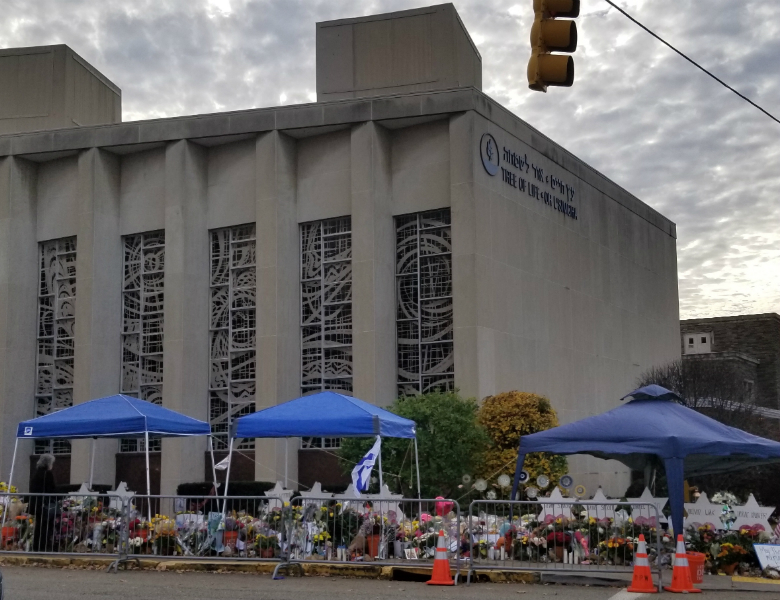B’nai Brith Canada chose an auspicious week in which to release its Annual Audit of Antisemitic Incidents for 2018.
Only two days before the launch, a gunman attacked a San Diego-area synagogue, killing a 60-year-old woman and wounding three others. Just a couple of day before that, the New York Times ran an editorial cartoon in its international edition that evoked longstanding anti-Semitic tropes: the caricature showed a blind, kippah-clad U.S. President Donald Trump holding onto a leash and being led by a dog wearing a Star of David collar, with the head of Israeli Prime Minister Benjamin Netanyahu, suggesting the old canard of Jews controlling powerful politicians.
And on the weekend before the release, a swastika and threats were daubed on the home of a Jewish family in Vaughan, Ont. – bringing anti-Semitism closer to home and apparently substantiating B’nai Brith’s findings that anti-Semitism is on the rise, both in Canada and abroad.

“For the third consecutive year, records were set in 2018 for anti-Semitism in Canada,” B’nai Brith’s League for Human Rights stated in its annual report.
Altogether, 2,041 incidents of anti-Semitism were reported in 2018, a 16.5 per cent jump from the year before.
“While vandalism and violence continued to target members of Canada’s Jewish community, harassment was the most dominant form of anti-Semitic expression in 2018, with a 28.4 per cent increase compared with 2017 – representing a 61.5 per cent increase since 2015,” B’nai Brith stated.

“Eighty per cent of incidents took place via online platforms such as Facebook, Twitter, Instagram, YouTube, email and others,” the report added.
At the same time, incidents of vandalism dropped from 327 to 221 and violent attacks also fell, from 16 in 2017 to 11 in 2018.
B’nai Brith’s finding that anti-Semitism is growing parallelled the most recent report of police data compiled by Statistics Canada.

According to Police-Reported Hate Crime, 2017, a document released by Statistics Canada last November, Jews were the single-most targeted group for hate crimes in Canada, despite amounting to only one per cent of the population.
Among the more egregious events reported by B’nai Brith were: a group of teens throwing lit fireworks at Hasidic Jews in Boisbriand, Que.; a group of Orthodox students being assaulted on the streets of Toronto; two Saskatchewan elementary school students being harassed and beaten by other students; a student threatening to “shoot up a Jewish school” in Toronto; and death threats made against children at a Montreal Jewish school that were posted on Le Journal de Montreal’s Facebook page.
B’nai Brith noted that the rise in occurrences in Canada is part of a broader trend. There has been “a dramatic increase in anti-Semitic incidents worldwide in 2018, particularly in Europe and the United States,” B’nai Brith reported.

“We are experiencing a disturbing new normal when it comes to anti-Semitism in this country, with expressions of anti-Jewish hatred surfacing in regions that are typically less prone to such prejudices,” said Michael Mostyn, the CEO of B’nai Brith Canada.
“Of particular concern is the rise of anti-Semitic harassment on social media, including death threats, threats of violence and malicious anti-Jewish comments and rhetoric.”
Ran Ukashi, the director of the League for Human Rights, said the rise in anti-Semitic incidents is troubling, but shouldn’t lead to fear.
READ: CANADIAN JEWS EXPERIENCED A SPIKE IN HATE CRIMES IN 2017
The level of anti-Semitic violence in Canada remains quite low, but there is always the risk that those who engage in anti-Semitism online will become more emboldened, he said.
The shooters at the synagogue in California and the Tree of Life synagogue in Pittsburgh were radicalized online, as was the New Zealand mosque shooter, he added.
B’nai Brith has suggested adopting of an eight-point plan to tackle anti-Semitism. It would include the creation of more dedicated hate crimes units in all major cities, enhanced police training and enforcement of anti-discrimination policies at universities, which have become “breeding grounds for anti-Semitism in Canada, including through an increase in far-left activism against Israel. This has a caustic effect on Jewish students, who are increasingly reporting incidents of vandalism and threats of violence,” the audit states.
